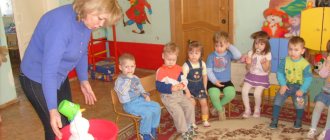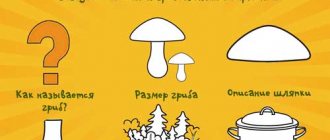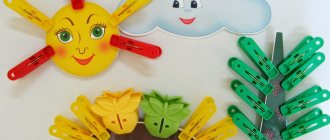Project for developing fine motor skills: “Our fingers can do everything.”
Project to develop fine motor skills in young children:
“Our fingers can do everything.”
Relevance of the problem.
The issue of developing fine motor skills in children is quite relevant. This is repeatedly emphasized by teachers, psychologists and other specialists in the field of preschool education. The relevance of work on the development of fine motor skills in young children is determined by the age-related psychological and physiological characteristics of children: in early and early preschool age, the structures and functions of the child’s brain intensively develop, which expands his capabilities in understanding the world around him. A person cannot develop a comprehensive understanding of the surrounding objective world without tactile-motor perception, since it underlies sensory cognition. It is with the help of tactile-motor perception that the first impressions of the shape, size of objects, and their location in space are formed. To teach a baby to speak, it is necessary not only to train his articulatory apparatus, but also to develop fine motor skills of his hands. The level of development of fine motor skills is one of the indicators of intellectual readiness for school, and it is in this area that preschoolers experience serious difficulties. Therefore, work on developing fine motor skills must begin long before entering school, namely from a very early age. Oral folk art is one of the simplest and most interesting materials for a child, which will quickly develop fine motor skills of the hands, and as a result, children’s speech.
The native culture should become an integral part of the child’s soul, the beginning that gives rise to personality. Now our national memory is gradually returning to us, and we are beginning to have a new attitude towards ancient holidays, traditions, and folklore. In oral folk art, special features of the Russian character, ideas about kindness, courage, and hard work have been preserved like nowhere else. By introducing children to these works, we introduce them to universal human values, because folklore is the richest source of children’s cognitive and moral development. Nursery rhymes, chants, songs, and finger games play a special role in the development of preschool children. The emotional appeal in these works involuntarily forces the child to listen. By repeating words, the child develops speech hearing, and the correct pronunciation of sounds is reinforced.
Only regular use of works of oral folk art in kindergarten will make it possible to lay the foundation for the child’s psychophysical well-being, expand vocabulary, activate cognitive and mental development, promote familiarization with the environment and develop fine motor skills.
Objective of the project:
To increase the level of development of fine motor skills in children of primary preschool age through the use of works of oral folk art and finger gymnastics.
Project objectives:
1. Develop memory, speech hearing;
2. Develop a monologue and dialogic structure of speech;
3. Contribute to the formation of the grammatical structure of speech, enriching the vocabulary of children;
4. Foster the sound culture of speech;
5. Develop imagination and mental activity;
6. Develop fine motor skills of fingers and hands, develop accuracy and coordination of hand and eye movements, hand flexibility, and rhythm.
Project participants: teachers, children, parents.
Project stages.
Preparatory stage.
1. Study the literature on this topic; 2. Prepare methodological material; 3. Develop a card index of finger games;
4. Select songs, chants, nursery rhymes according to the age of the children; 5. Develop a long-term plan for working on the development of fine motor skills in children’s hands;
6. Create the necessary conditions for a developmental environment in a group on the topic;
7. Invite parents to help with this problem;
8. Develop diagnostic material to track the results of the effectiveness of the project implemented in the work.
Organizational stage.
Work on the development of fine motor skills is carried out with children of the first junior group throughout the entire school year in all educational blocks: in direct educational activities, in routine moments, in joint activities of the teacher with children, in independent activities of children.
The group has selected material on the topic: card index of finger games, “Finger Theater”, didactic games “Laces”, “Puzzles”, “Collect beads”, “Lay out a pattern” (from seeds), “Magic buttons”, “Cinderella”, “ Games with clothespins,” mosaics, insert frames, wooden nesting dolls, pyramids, stencils, coloring books, construction sets, material on various types of productive activities (modeling, drawing, appliqué, design), counting sticks, methodological literature, etc. Children can do all this use in joint and independent activities.
Every morning before breakfast, a speech minute is held with the children, where each new week begins with learning a new finger game, song, chant, nursery rhyme. All this is planned in accordance with the long-term project implementation plan. Work on the project is also carried out through direct educational activities (drawing, speech development, design, modeling, music), through routine moments: fiction, various didactic and outdoor games, walks.
For the best result, a lot of work is being done with parents on the topic. For this purpose, the group has created a “School for Parents: Happy Baby.” As part of the project, visual information has been selected for parents on the problem of developing fine motor skills in children, and once a quarter, parents meet in a group for seminars, master classes, trainings, etc.
The final stage.
Summing up the project.
Carrying out monitoring on the topic in order to identify intermediate results of work on the project (January) and results at the end of the school year (May) helps to track the success of each child and pay special attention to children who showed low results. This allows you to most effectively structure the work when implementing the project during the current academic year and determine the prospects for work for the next academic year.
Project implementation.
| Month | Subject | Program content |
| September | 1. “Pussy, pussy, pussy, scat...”; Finger game "Magpie-Magpie". | Encourage to pronounce the end of the line; activate finger movements, develop speech; provide children with food. |
| 2. Nursery rhyme “Okay, okay...”; Finger game "My Family". | To form a positive emotional attitude in children to work together; develop a sense of your own movements; develop fine motor skills of the fingers. | |
| 3 Song “Our ducks in the morning...”; Finger game “This finger went into the forest...” | Develop hand motor skills, increase children’s interest in exercises; combine games and exercises for training fingers with children’s speech activities. | |
| 4. “The cat went to Torzhok...”; Finger game “Masha put on a mitten.” | Teach children to perform exercises, accompany them with demonstration and clear pronunciation of the text; develop hand motor skills. | |
| October | 1. “Our Masha is small”; Finger game “This finger is grandpa...” | Activate finger movements; actively develop your vocabulary; Form a positive emotional attitude in the child. |
| 2. Nursery rhyme “Cucumber, cucumber...”; Finger game “This finger wants to sleep...” | Develop finger motor skills; combine games and exercises for training fingers with children’s speech activities. | |
| 3. “Water, water, wash my face...”; Finger game "Horned Goat". | Teach the child to perform actions with his hands in accordance with the poetic text; develop fine motor skills of the hands. | |
| 4. The nickname “The sun is a bucket”; Finger game "Finger-boy". | Develop hand motor skills, increase children’s interest in exercises; combine games and exercises for training fingers with children’s speech activities. | |
| November | 1. “Egorka the Hare”; Finger game "Funny Painters". | Develop hand motor skills by performing imitative movements accompanied by a poetic text; enrich the child’s vocabulary, develop memory. |
| 2. Nursery rhyme “Because of the forest, because of the mountains...”; Finger game "Children". | Develop fine motor skills of both hands; activate children's vocabulary, develop memory. | |
| 3. Song “Oh doo-doo, doo-doo, doo-doo...”; Finger game “A squirrel is sitting on a cart...”. | Develop hand motor skills by performing imitative movements accompanied by a poetic text; develop children's speech, activate vocabulary. | |
| 4. Song “Chicky, chicky, chicky...”; Finger game "To work". | Develop fine motor skills of the hands; Encourage the child to repeat words after the teacher, perform imitative movements accompanied by a poetic text. | |
| December | 1. Song “A fox with a box ran through the forest...”; Finger game "Fingers". | Develop fine motor skills of both hands; consolidate the ability to pronounce text clearly and correctly. |
| 2. Nursery rhyme “Little kitten…”; Finger game "We count". | Develop fine motor skills of both hands; consolidate the ability to pronounce text clearly and correctly. | |
| 3. Game exercise “On a visit”; Finger game "Mosquito". | Learn to perform game tasks using tactile tracks; develop fine motor skills of the hands. | |
| 4. “Hello, golden sun...”; Finger game "Naughty". | Induce an emotionally positive attitude; develop fine motor skills of the hands. | |
| January | 1. Song “Like through a meadow, meadow”; Finger game "Claws". | Develop fine motor skills of the hands; Encourage the child to repeat words after the teacher, perform imitative movements accompanied by a poetic text. |
| 2. Working with paper “It’s snowing”; Finger game "Walk". | Teach children to tear paper into small free-form pieces; consolidate the ability to clench and unclench your fingers into a fist; develop fine motor skills of the hands. | |
| 3. Working with natural material “Bridge”; Finger gymnastics “Track”. | Teach children to work according to the model, laying out the beans; develop fine motor skills of the fingers; activate children's speech, encouraging them to pronounce all the words of the game. | |
| 4. “Snail, snail...”; Finger gymnastics “This finger wants to sleep...”; “This finger is a grandfather.” | Teach children to pronounce the nursery rhyme clearly. Repeat already familiar finger games; activate children's speech; develop fine motor skills of the hands. | |
| February | 1. Song “Our ducks in the morning...”; Finger gymnastics "Magpie". | Encourage to pronounce the end of the line; activate finger movements, develop speech; provide children with food. |
| 2. Song “I love my little cow”; Finger gymnastics “Hedgehog”. | Develop fine motor skills of the fingers; activate children's speech. | |
| 3. Song “Like our cat...”; Finger gymnastics “Masha put on a mitten.” | Teach children to perform hand movements while reading nursery rhymes; develop finger motor skills; create a joyful mood. | |
| 4. Game exercise “Snake”; Finger gymnastics “Hey, hey, blue snake.” | Learn to lay out a button according to size; expand children's vocabulary; develop finger motor skills. | |
| March | 1. Didactic exercise “Let’s make beads for a nesting doll”; Finger gymnastics “Beads and peas”. | Teach children to string wooden beads on threads; consolidate the ability to alternate objects by color; develop finger motor skills. |
| 2. Didactic game “Visiting the Whisperer”; Folk nursery rhyme “Butterfly”. | Teach children to group homogeneous objects that differ in size; stimulate the development of sensory perception, finger mobility; develop fine motor skills. | |
| 3. Game exercise “Let's help the bunny”; song “Bunny, bunny...” | Learn to lay out a path of beans; to form visual-motor coordination and a sense of space on a sheet of paper; develop fine motor skills of the fingers; create a positive emotional attitude towards completing the task. | |
| 4. Didactic game “Let’s feed the birds”; Finger gymnastics “Birds”. | Teach children to draw with their index finger on their rump; develop fine motor skills of the fingers. | |
| April | 1. Nursery rhyme “The sun is shining through the window”; Finger gymnastics “Sun”. | Teach children to draw with their fingers on the rump; continue fixing the shape (round); develop fine motor skills of the fingers; activate children's speech. |
| 2. Song “Goat-dereza”; Finger gymnastics “Lacing”; | Teach children to thread shoelaces through the hole; develop fine motor skills of the fingers; activate the vocabulary, develop children's speech and thinking. | |
| 3. Nursery rhyme “Oh, you little bunny is shot”; Didactic exercise “Let's help Dunno”; | Continue teaching children lacing; consolidate the ability to correctly thread the braid into the hole; develop the ability to correctly pronounce the words of the game; develop finger motor skills. | |
| 4. Didactic game “Umbrella for the Bunny”; Finger gymnastics “Bunny”. | Teach children to arrange matches according to a pattern; develop finger motor skills; consolidate the ability to perform hand movements according to the text. | |
| May | 1. Didactic game “House for a Hedgehog”; finger gymnastics “Hedgehog”. | Continue teaching children to work with matches, lay out a house according to a model; fix the names of geometric shapes; develop fine motor skills of the fingers. |
| 2. The chant “Rain, rain, more fun...”; Didactic game “Colorful lids”; | Teach children to build buildings from lids, fix the color of the lids; to form attention, imagination, creativity; develop fine motor skills of the fingers. | |
| 3. Didactic game “The beads scattered”; Finger gymnastics “To work”. | Teach children to sort objects (beads) by color; fix the name of the flowers; develop fine motor skills of the hands. | |
| 4. “Let's play with our fingers”; Repetition of nursery rhymes and songs. | Repeat with the children all the nursery rhymes, songs, finger games you have learned; consolidate children’s ability to combine finger play with speech activity. |
Project implementation period
The project is designed for one academic year.
How will the effectiveness of the project be assessed:
Based on the results of monitoring and observation.
Expected Result:
— by the end of the year, children’s fingers will become more dexterous, their hands will become mobile and flexible, and stiffness in movements will disappear; - children’s interest in finger games will increase, children will begin to master complex exercises; - children will master motor skills, the activity of articulatory organs is improved: lips, tongue, lower jaw, etc.; — they will talk more with adults and communicate with peers.
What happened as a result:
As a result of the project, it was possible to increase the level of development of fine motor skills in children, and teach children a large number of finger exercises, nursery rhymes, songs, and chants. Various types of activities contributed to the development of such mental functions in children as thinking, memory, attention, speech; spatial orientation improved; Such qualities as perseverance, patience, and the desire to complete the work started were cultivated. Children acquired practical skills needed in life. Parents are familiar with the work that is being done in the group on this topic and its significance, and willingly take part in joint activities. Perspective :
Continue work on developing fine motor skills in children and develop a further system of work. Accumulate material on this topic.
Project "Funny Fingers"
Project "Funny Fingers"
(Development of speech in young children through finger games)
Relevance of the project: after many years of studying the activity of the brain and psyche in children, scientists came to the conclusion that it is the hands and fingers that play a huge role in the development of a child. And the level of development of children's speech directly depends on improving fine motor skills of the hands. Therefore, scientists strongly recommend stimulating and developing a child’s speech through constant finger training. The more active and precise the finger movements of a small child, the faster he begins to speak. Simple hand movements help remove tension not only from the hands themselves, but also from the lips, and relieve fatigue. They can improve the pronunciation of many sounds, which means they can develop the child’s speech.
Finger games are an absolutely necessary thing, because every game is based on children's songs and nursery rhymes. Such games bring pleasure and joy to the baby, and these feelings are the strongest means of stimulating the active perception of speech and generating independent speech activity.
Project goal : development of speech in young children through the development of fine motor skills through finger games.
Tasks:
- enrich vocabulary
- develop memory and coherent speech
- develop coordination of movements of fingers and hands
- train fine finger movements
- stimulate visual and auditory perception
- shape the emotional development of children
- to increase the competence of parents in the importance of finger games for young children
Project type:
- Frontal group aimed at developing fine motor skills
- Long-term (October-May)
Project participants: teachers, children, parents
Expected Result:
- enrichment of children's active and passive vocabulary
- increased cognitive interest
- development of fine motor skills of fingers and hands
- development of coherent speech
- development of memory and attention
- reinforcing palm games
Preparatory stage:
- defining the topic, goals and objectives, project content, predicting the result
- studying methodological literature on this topic
- monitoring of children in the speech development group (September)
- compiling a card index of finger games
The main stage of the project implementation:
- drawing up a long-term plan for conducting finger games, including finger games in lesson notes, morning exercise complexes, in the script of matinees, in morning and evening periods of time.
- development of recommendations for conducting finger games for parents
Working with parents:
- individual and group consultations “Speech and fingers”, “How to properly conduct finger games with a child”, “Finger steps”;
- conversations with parents “Children and fine motor skills”;
- assistance from parents in making games and attributes for the development of fine motor skills of children’s hands
The final stage:
- Monitoring of children on speech development (May)
- Analysis of the work done on the project, identify the positive results of the work done, analyze the shortcomings.
- Design of the photo newspaper “Jolly Fingers”







